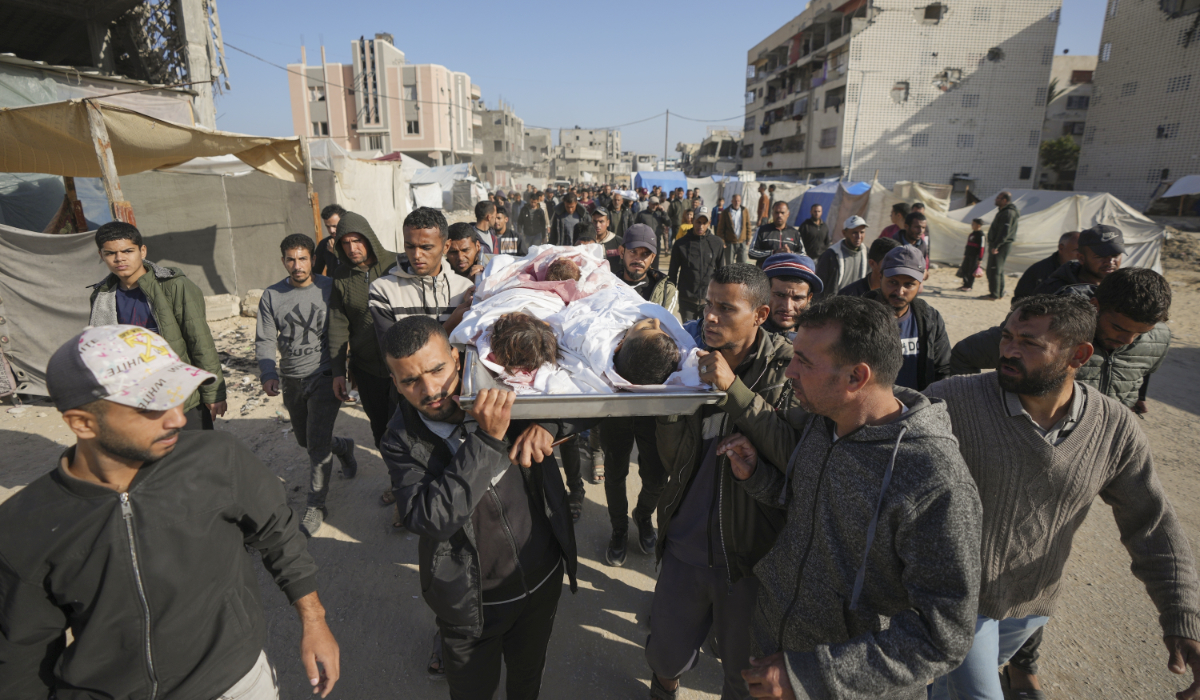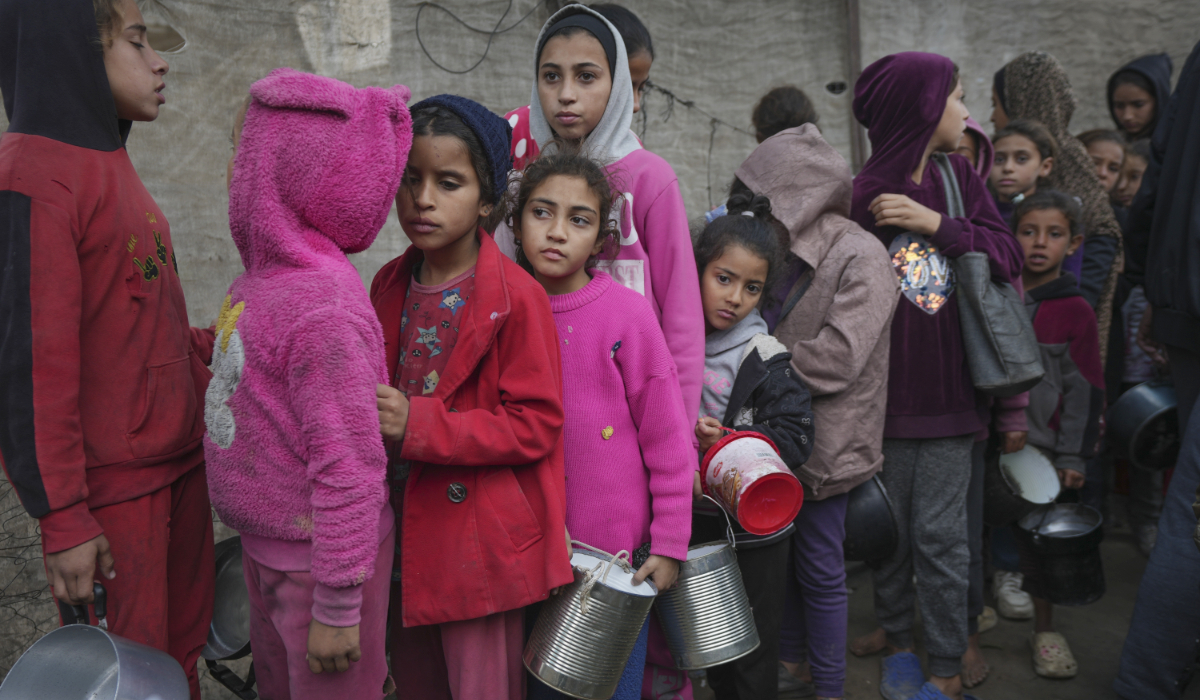NEW YORK CITY: The UN on Tuesday expressed serious concerns about the risk of an escalation in the fighting between Israel and Hezbollah, warning that not only would it cause even more suffering and devastation to the people of Lebanon and Israel but also “more potentially catastrophic consequences for the region.”
Tor Wennesland, the UN’s special coordinator for the Middle East urged both sides to take urgent, immediate steps to deescalate the situation.
Tensions along the border between Israel and Lebanon continue to escalate. Cross-border exchanges of fire have increased in recent weeks, prompting UN Secretary-General Antonio Guterres to warn that the risk of the conflict spreading to the wider region “is real and must be avoided.”
Wennesland was speaking during a meeting of the Security Council to discuss the implementation of Resolution 2334, which was adopted in 2016 and demands an end to all Israeli settlement activity, immediate steps to prevent violence and acts of terror against civilians, and calls on both sides to refrain from provocative actions, incitement and inflammatory rhetoric.
Wennesland said he was “deeply troubled” by continuing Israeli settlement expansion in the occupied West Bank, including East Jerusalem, and reiterated that all settlements “have no legal validity and are in flagrant violation of international law.” He called on Israel to cease all such activity immediately.
Escalating violence and tensions in the occupied West Bank, including East Jerusalem, are also deeply worrying, Wennesland said.
“Intensified armed exchanges between Palestinians and Israeli security forces, alongside lethal attacks by Palestinians against Israelis and by Israeli settlers against Palestinians, have also exacerbated tensions and led to exceedingly high levels of casualties and detentions. All perpetrators of attacks must be held accountable,” he added.
Wennesland blamed regional instability on the ongoing hostilities in Gaza and stressed the need for the immediate and unconditional release of all hostages, and an immediate humanitarian ceasefire.
“There is a deal on the table and it should be agreed,” he told council members. “I welcome the efforts, including by Egypt, Qatar and the United States, to reach such deal.”
He lamented the fact that effective mechanisms from Israel to provide humanitarian notifications, safe conditions for humanitarian operations, and sufficient access for aid workers to address humanitarian needs remain “sorely lacking and must be put in place without delay.”
Wennesland added: “Hunger and food insecurity persist. While projections of imminent famine in the northern governates have been averted through an increase in food deliveries, food insecurity has worsened in the south.
“Nearly all of Gaza’s population continues to face high levels of food insecurity, with nearly half a million people facing ‘catastrophic’ insecurity.”
Senior UN officials told Israeli authorities on Tuesday they will suspend aid operations across the battered enclave unless urgent steps are taken to protect humanitarian workers.
The UN World Food Program has already suspended aid deliveries from a US-built pier in Gaza over security concerns. This comes at a time when the amounts of essential goods allowed into Gaza continue to fall far short of the needs of the population, Wennesland said.
The Palestinian Authority’s fiscal situation remains “very precarious,” he added. Israel’s finance minister has announced his intention to continue blocking the transfer of all clearance revenues to the PA, and to take action that would end relations between Israeli and Palestinian banks at the end of June.
Such moves, Wennesland said, “threaten to plunge the Palestinian fiscal situation into an even greater crisis, potentially upending the entire Palestinian financial system.”
Meanwhile, Maximo Torero, the chief economist of the UN’s Food and Agriculture Organization, on Tuesday warned of the “extreme risk of famine” in Gaza. He said the latest studies reveal that more than half of the population does not have any stocks of food in their homes, and more than 20 percent go entire days and nights without eating.
In northern Gaza, Torero said, 75,000 people, a quarter of the population, face catastrophic levels of food insecurity, and 150,000 are dealing with emergency levels of food insecurity.
In southern Gaza, including the Rafah area, more 350,000 people, a fifth of the population, are affected by catastrophic levels of food insecurity, and about 525,000 by emergency levels.
In response to these findings, humanitarian organization CARE’s interim country director for the West Bank and Gaza, Daw Mohammed, said: “The process to determine the difference between ‘famine’ or ‘catastrophic food insecurity’ is irrelevant for Palestinian people in Gaza, too many of whom have starved to death or will never fully recover from the ravages of hunger.
“The scale and intensity of hostilities, as we enter the ninth month of hell for people in Gaza, make data collection a life-threatening exercise and survival an hourly battle. Rather than wait for a determination of famine, we must listen to the call of humanity and act now.
“We need an immediate and sustained ceasefire, a massive increase in the safe flow of aid and aid workers into and around Gaza, access to water, fuel and basic healthcare services for all people, and the release of all hostages. There is no more time to wait.”
During the Security Council meeting, the US representative to the UN, Linda Thomas-Greenfield, blamed Hamas for rejecting a US-backed ceasefire deal.
“Hamas has eschewed the calls from this council and ignored voices from across the international community,” she said. “In fact, rather than accept the deal, Hamas has added even more conditions.
“It’s time to end the intransigence from Hamas, start a ceasefire and release the hostages.”
Her Russian counterpart Vassily Nebenzia said that the US-backed Resolution 2735, which calls for a ceasefire and was adopted on June 10, was sold to the Security Council “in the guise of a solution for saving Gaza. This kind of ‘cat in a sack,’ as we warned, turned out to be dead letter.”
He added: “What is even worse, in the resolution of the Security Council a blatant lie crept in; it is explicitly stated there that Israel consented to the peace proposal of the international mediators. However, in West Jerusalem this has not yet been confirmed and they repeat that at the same time as announcing the decisive intent to completely destroy Hamas.
“Ultimately, none of the phases stipulated in Resolution 2735 have been implemented. The council essentially was blindly dragged into a misadventure and moved towards blessing a scheme which, from the get go, had no chances of being implemented.
“We urge the membership of the Security Council, moving forward, to adopt a more conscientious approach to those decisions which they support, and to give thought to their actual content.”

























